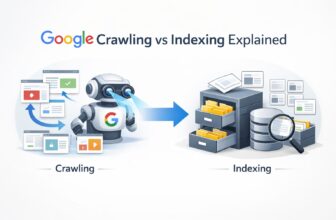Are you looking to optimize your website and increase your visibility online? You can do this by utilizing effective keyword research tools. Keyword research tools help you to identify the right words and phrases to target in your website content, allowing you to increase the ranking of your website in search engine result pages (SERPs).
In this blog, we will explore the top keyword research tools that you can use to maximize your SEO impact. We will look at what keyword research is, the benefits of keyword research, how to choose the right keyword research tools, keyword research tips, and how to use keyword research for SEO. If you’re not aware of the keyword research process and uses then I’ll recommend you get help from a reputed digital marketing agency to make your SEO campaign successful.
Let’s explore some of the top free keyword research tools to use in 2023 to find the most profitable keywords.
1. Google Ads Keyword Planner
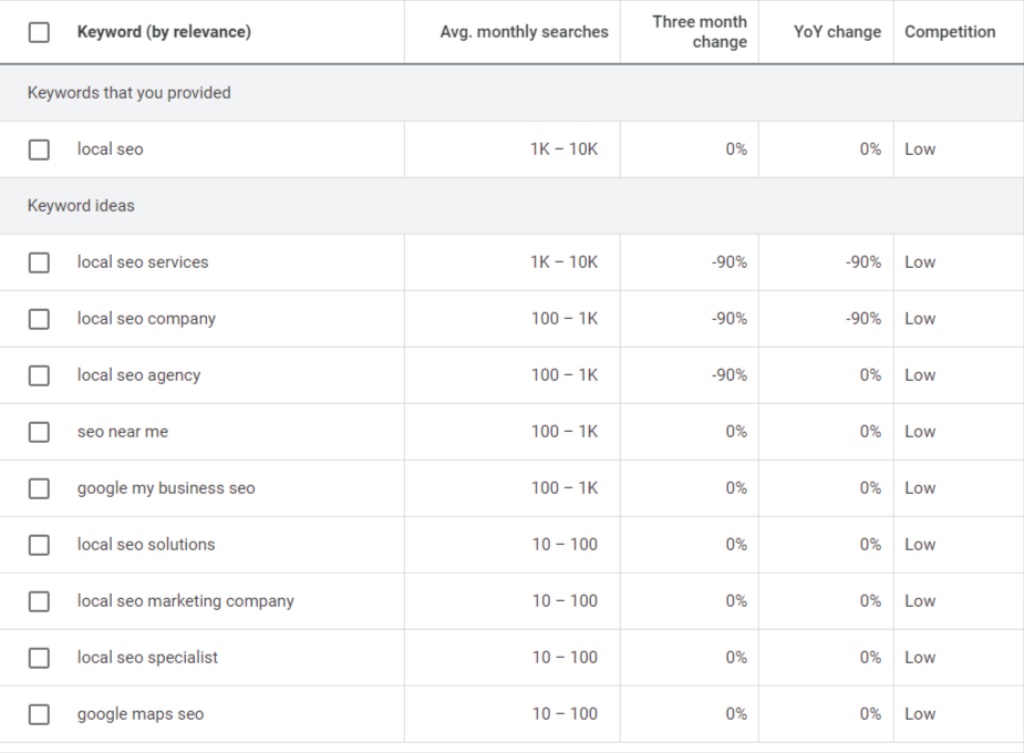
With the Google Ads Keyword Planner, you can easily and quickly find keywords for your ads and SEO projects. Google Ads Keyword Planner is one of the most used keyword research tools that provide many insights into your keyword research process. The main reason for the popularity of this tool is that Google developed its own. As we know Google is the biggest search engine with large data of search terms used by people. That’s why this tool has a strong ability to provide relevant keywords and historical stats.
Look at a few features of the Google Keyword Planner tool that make this the most usable keyword research tool.
| Locations and languages | Choose the location where you want to rank your targeted keywords |
| Where you are located and what languages people use in the location can have a big impact on what keywords and phrases show up when people search for your products or services. Using this tool, you can find keywords as per your targeting locations and languages your potential customers use for speaking. This tool will give you all possible phrases that might work well in targeting specific demographics! | Do you want to rank your keywords in a specific location and want to find keywords that people search the most in that location? Don’t worry. Google Keyword Planner provides this feature so that you can research keywords based on locations. This will help you find location-based keywords that you can use to optimize your website to get found in Search engines. |
| Choose the language type that your targeting customers speak | Use a website as a source of keywords |
| When using Google’s keyword planner tool, it is important to choose the language type that your target customers speak. This will help you get more accurate results when searching for keywords. If you’re not sure which language your target customers speak, you can use Google’s search engine to find out. Simply enter a keyword into the search engine and see what languages come up in the results. You can then use this information to choose the right language type for your keyword planner tool. | If you aren’t aware of the keywords related to your business website then you can choose this option. You can use your website; this tool will suggest relevant keywords that match your website content. This is the key feature of this tool you can use to find niche keywords. |
| Average monthly searches (“Avg. monthly searches”) | Three-month change |
| This report shows the average number of searches for this keyword and its close variants based on a month range, and the location(s) you selected in Search Network settings. Use these numbers to see how popular your keywords are and how many searches are on a monthly basis. | Three-month change’ is an important feature that shows a three-month change in search trends by comparing the latest month’s data, with the data from two months prior. For example, if the latest month is July, the July data would be compared to May to show a change in search volume over three months. |
2. Google Trends

Google Trends is a powerful tool in the digital marketing world. They can be utilized for everything from technological forecasting to SEO optimization. There are so many ways you can leverage Google Trends, but you need to know what your goals are before deciding which one is best for you. Let’s say you want to know when the most popular fitness accessories came out. In that case, you would use Google Trends for tech forecasting. Or perhaps your main goal is to track the success of athletes, performers, and other influencers on social media?
When it comes to using Google Trends, you have a lot of options. You can generate new trends for your target market or look for trends that may suit your location. When you’re putting together an SEO strategy, it’s important to review the search behavior of people in certain locations or demographics. This is where Google Trends could come in handy. If a person searches “local experts” they might be looking for people who live in their area or those who are already local to them. You can use multiple metrics across different areas and target different age groups or genders to determine what types of trends you should make.
So, you’re planning to get more traffic for your website. One of the best ways to do this is with keyword research using Google Trends. What makes Google Trends such a great tool? For starters, it can show you if a particular word or phrase is trending in any given time period. Look below how you can use Google Trends for keyword research:
- Understand Keyword Search Volume
- Identify Seasonal Trends
- Avoid Temporarily Popular Keywords
- Find Trending Relevant Topics
- Use Trend Predictions
- Find Related Queries to Beat the Competition
- Optimize Your Local SEO Strategy
- Enhance Your Video SEO Strategy
3. Bing Webmaster Tools Keyword Research
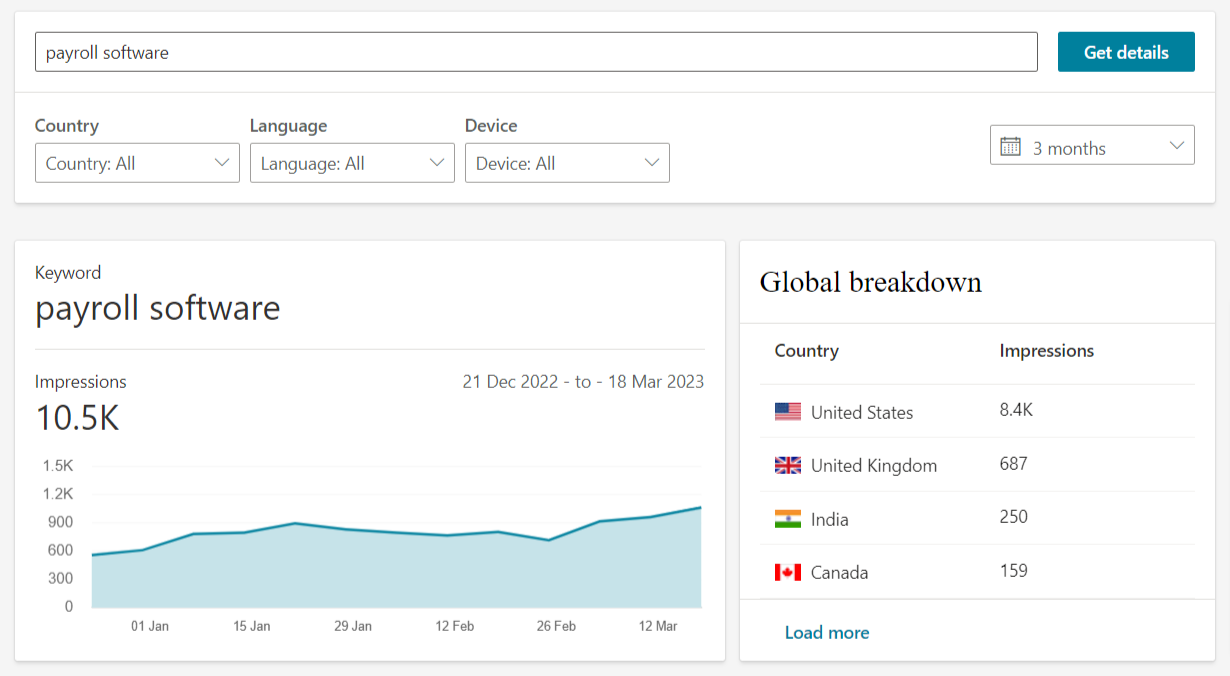
Researching keywords and phrases is crucial for content creators. If a customer is looking for information on a topic, the more successful content you create is going to be the one that they come across. To conduct keyword research, content creators should first use the Bing Webmaster Keyword Research Tool. The tool has several features that can assist you with your research such as suggested keywords and word combinations, general search volume, and trend analysis which projects how that volume may change over time. Furthermore, it also analyzes the top trending terms to provide users with some insight into what is currently popular and relevant in the market today.
Keyword research is a vital part of any marketing campaign. However, the Bing Keyword Research tool gives you more than just keywords. It provides you with suggestions, stats, and insight along with other relevant information. The Bing Webmaster Tools Keyword Research is designed to specifically assist webmasters and content creators with that task. The Bing Keyword Research tool gives you keyword ideas and stats of how frequently these keywords are searched for, along with the associated trend to see how those volumes have changed over time. Furthermore, the Bing Keyword Research tool also segregates these keywords to show the ones which have recently become relevant and also lists the questions that these keywords have appeared in if any. Among other functions, it is possible to view search volume over time, check available ad results based on a keyword term, or utilize this tool as a quick reference guide on SEO basics.
The Bing Webmaster Tools Keyword Research tool recommends keyword ideas for:
- Related Keywords
- Question Keywords
- Newly Discovered
- Trends
- Impressions
- Top 10 URLs Ranking on the Keyword
4. Semrush Keyword Research – Find Keywords in Minutes
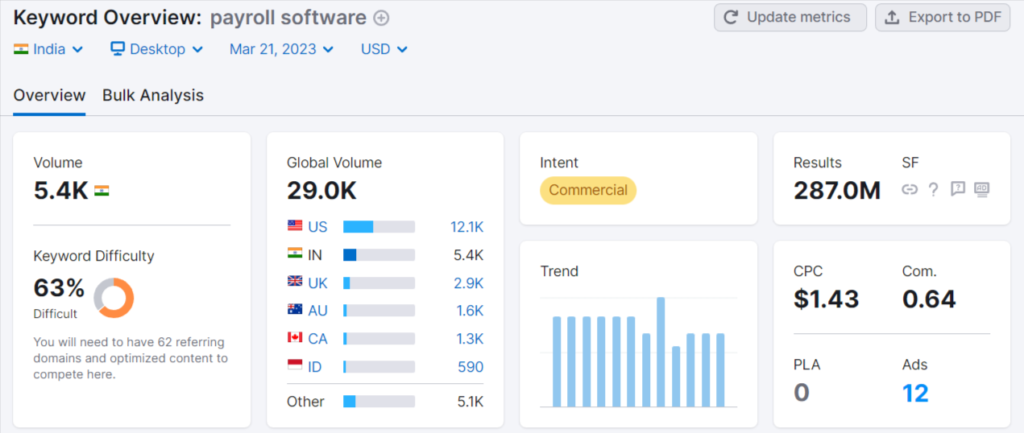
Semrush Keyword Research is a keyword research tool that gives you the information you need to make informed decisions about your marketing. With the world’s largest keyword database at your fingertips, you can find what keywords are driving traffic, the keyword difficulty score, and its related keywords. You can also uncover how costly it would be to rank for certain keywords, what advertisers are bidding on those keywords, and more.
The Semrush Keyword Research tool is an incredibly powerful way to find keywords in minutes. With its vast keyword database, you can uncover keyword difficulty scores, related keywords, keyword intent, cost-per-click, and much more. What’s more, Semrush is constantly updating its database with new information, making it the most comprehensive and accurate keyword research tool on the market. If you’re serious about SEO, then Semrush is a must-have tool in your arsenal.
Why choose Semrush keyword research?
- Uncover keyword difficulty score
- Related keywords
- Keyword intent
- Cost-per-click & more
- World’s largest keyword database of 20 billion keywords at your fingertips
- Best SEO Tool 2022 Winner
- 40+ trillion backlinks
- 140+ geo databases
- 800,000,000+ domains
6. Moz Keyword Explorer
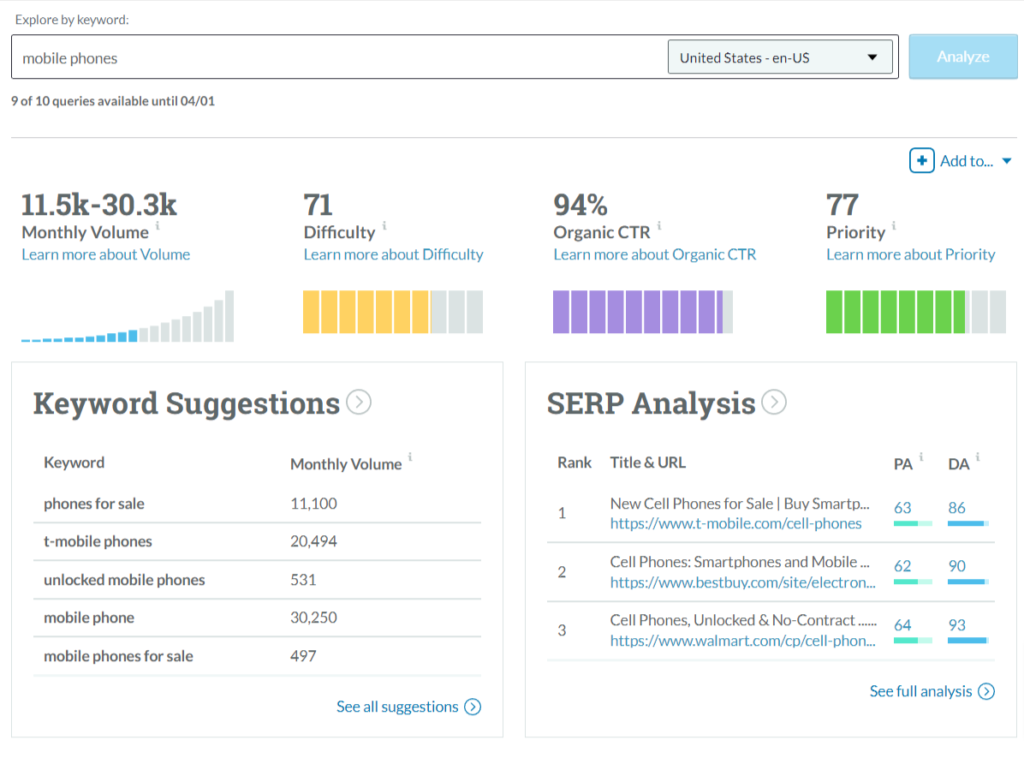
Moz Keyword Explorer is a powerful keyword research tool that provides detailed insights into the search terms that people use when searching online. It also provides keyword suggestions, helping you to find the right phrases to target.
It’s a great tool for researching keywords and understanding their search volume and competition. It provides valuable insights into the search terms people use in your industry, so you can create targeted content that resonates with your audience. It’s also really easy to use, so you can get up and running quickly. I hope this helps!
7. KeywordTool.io
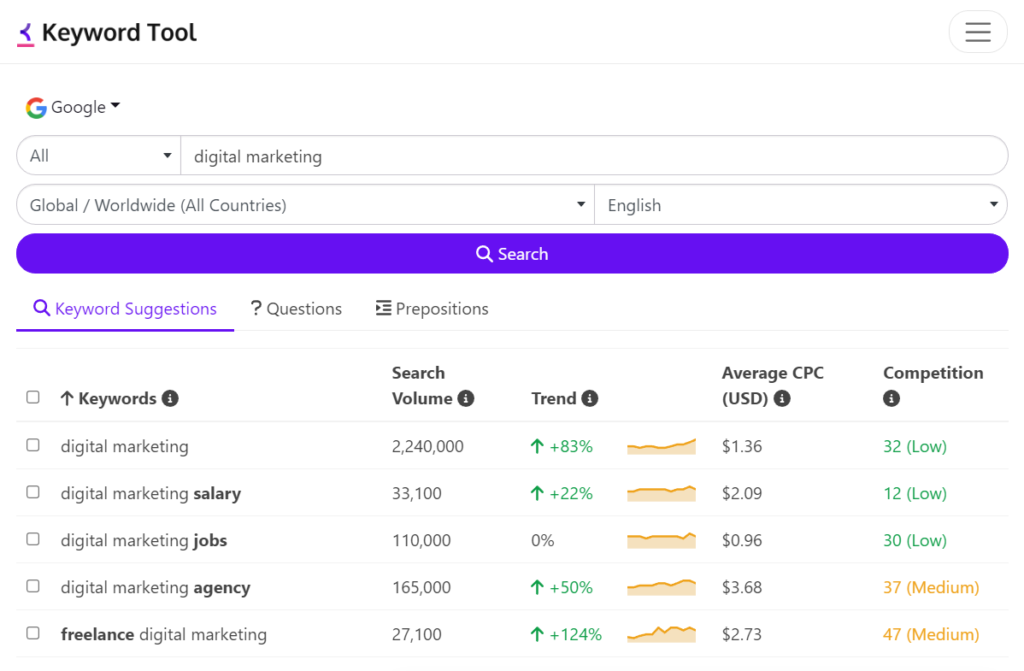
KeywordTool.io is an easy-to-use keyword research tool that provides detailed insights into the search terms that people use when searching online. It also provides keyword suggestions, helping you to find the right phrases to target.
KeywordTool.io is a great tool for helping you find the best keywords to use for your online content. It’s an easy-to-use platform that allows you to quickly generate a list of relevant keywords based on your search query. What’s great is that it also provides you with search volume, competition, and CPC data so you can make an informed decision about which keywords to use. Give it a try and see how it can help you optimize your online content!
8. KWFinder
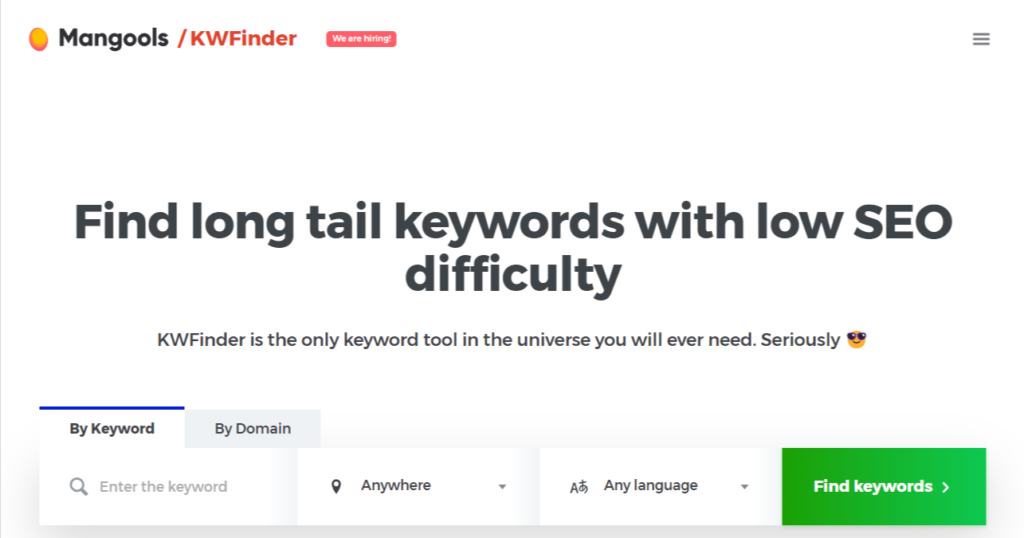
KWFinder is a powerful keyword research tool that provides detailed insights into the search terms that people use when searching online. It also provides keyword suggestions, helping you to find the right phrases to target.
KWFinder is a great tool for researching and discovering the best keywords for your website. It is easy to use and provides comprehensive data such as keyword difficulty, search volume, and related terms. It’s perfect for SEO professionals, content writers, and anyone who wants to optimize their website for the best possible search engine results. With KWFinder, you can easily find the most relevant and profitable keywords for your website.
9. Ubersuggest
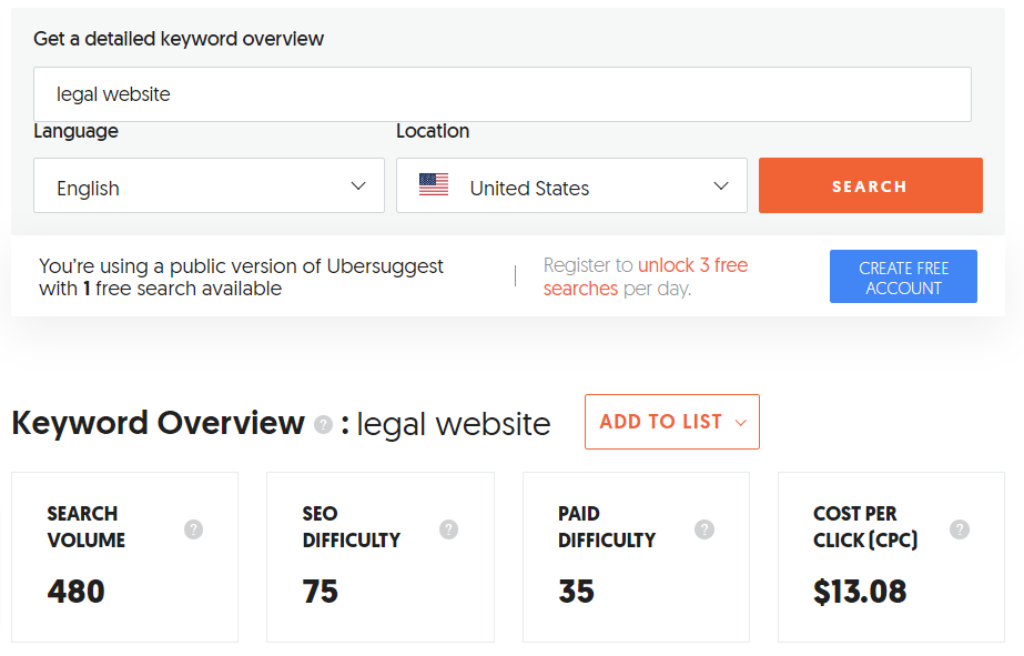
Ubersuggest is a free keyword research tool from Neil Patel that provides detailed insights into the search terms that people use when searching online. It also provides keyword suggestions, helping you to find the right phrases to target.
Ubersuggest is a great keyword research tool that can help you find the best keywords for your content. It provides detailed keyword suggestions, search volume, competition level, and estimated CPC for each keyword. Additionally, it has a powerful Keyword Overview tool that allows you to compare multiple keywords in one place and quickly identify trends and opportunities. It’s a great tool for any content creator looking to maximize their SEO efforts.
10. WordStream
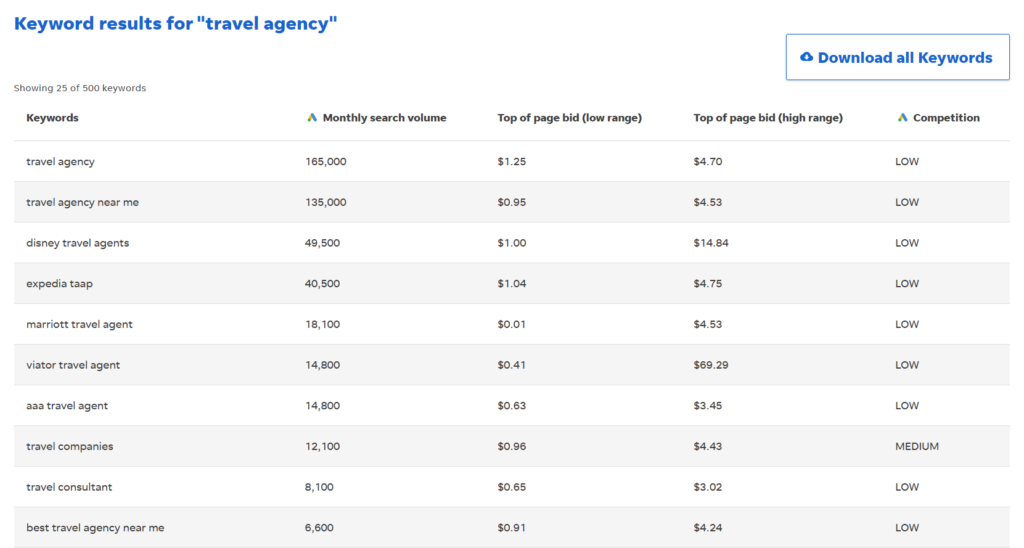
WordStream is a comprehensive keyword research tool that provides detailed insights into the search terms that people use when searching online. It also provides keyword suggestions, helping you to find the right phrases to target.
WordStream’s Free Keyword Tool offers a great way to quickly find relevant and profitable keywords for your website or business. It’s easy to use and provides detailed keyword analysis and metrics to help you create the perfect keyword strategy. With WordStream’s Free Keyword Tool, you can quickly find valuable keywords, related keywords, and long-tail keywords that will help you optimize your website and get the most out of your SEO efforts. Try it out now and see how simple it is to find the right keywords for your website!
11. Long Tail Pro

Long Tail Pro is a powerful keyword research tool that provides detailed insights into the search terms that people use when searching online. It also provides keyword suggestions, helping you to find the right phrases to target.
Long Tail Pro is an incredibly powerful long tail keyword planner tool that can help you quickly and easily find the best keywords to target for your website. With its intuitive interface and powerful features, you can quickly find the best long-tail keywords to target with your SEO and PPC campaigns. The keyword research tool makes it simple to uncover valuable insights from multiple sources, allowing you to identify the best keywords for your business.
With Long Tail Pro, you can quickly analyze keyword competition, uncover related keywords, and identify potential keyword opportunities. Thanks to its comprehensive keyword research tool, you will have all the information you need to optimize your content and maximize your website’s visibility. Try Long Tail Pro today and take your SEO and PPC campaigns to the next level!
12. SERPstat

SERPstat is a comprehensive keyword research tool that provides detailed insights into the search terms that people use when searching online. It also provides keyword suggestions, helping you to find the right phrases to target.
SERPstat is a great tool for conducting keyword research, as it offers a wide range of features to help you identify the best keywords for your website. With SERPstat, you can track keyword rankings in real-time, compare your rankings to those of your competitors, and discover new keywords and topics you can use in your content. You can also analyze keyword trends, get detailed search volume statistics, and more. SERPstat’s keyword research tools are a great way to help you optimize your SEO efforts and increase your website’s visibility.
13. Ahrefs Free Keyword Generator Tool

Ahrefs is a popular SEO tool that offers a range of features, including a free keyword generator tool. With this tool, you can discover keyword ideas, see key SEO metrics like Keyword Difficulty and search volumes, and identify long-tail keywords. You can also analyze the competition and research keyword ideas in nine other search engines, including YouTube, Bing, Yahoo, Amazon, Yandex, and Baidu.
One of the key features of the Ahrefs keyword generator tool is that it allows you to create lists of your best keywords in just a few clicks. This can be a great way to keep track of the keywords that you want to target and monitor their performance over time.
According to reviews on g2.com, the Ahrefs keyword generator tool has a rating of 4.6 out of 5, based on 454 reviews. Users appreciate that the tool is easy to use and that it provides nearly accurate organic search traffic data for any website. Ahrefs also offers comprehensive reports on your site’s performance and traffic flow, making it a useful tool for analyzing your website’s SEO. The site audit feature is especially useful for identifying and fixing errors and warnings that could be hurting your website’s ranking.
Another feature that users appreciate is that Ahrefs can help verify SEO opportunities by analyzing competitor statistics. This can give you valuable insights into what your competitors are doing to rank well in search results and help you identify ways to improve your own SEO strategy.
Overall, the Ahrefs free keyword generator tool is a powerful tool that can help you identify new keyword opportunities and improve your website’s SEO. If you’re looking for a comprehensive SEO tool that offers a wide range of features, Ahrefs is definitely worth considering.
14. Free Keyword Research Tool from Wordtracker
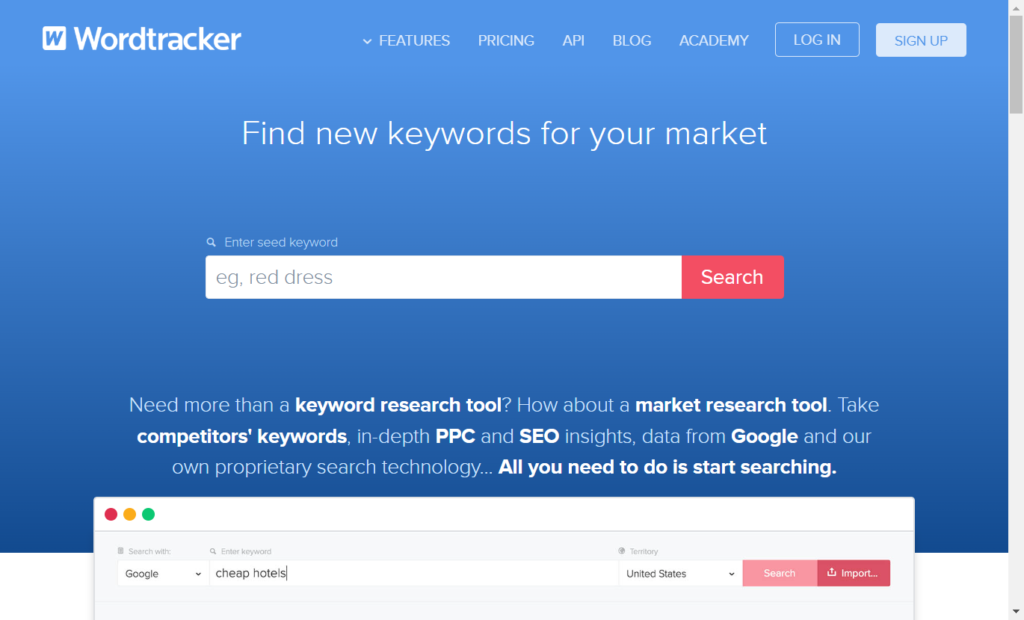
Wordtracker is a powerful and free keyword research tool that offers an excellent alternative to Google Keyword Planner. With Wordtracker, you can uncover thousands of profitable long-tail keywords, with up to 10,000 results per search.
This tool provides valuable SEO metrics like keyword search performance, volume, and competition. Additionally, Wordtracker offers convenient to save and export features.
With a rating of 4.4 out of 5 from 10 reviews on g2.com, Wordtracker is highly regarded by users. If you need more than just a keyword research tool, Wordtracker also offers a market research tool that provides competitors’ keywords, in-depth PPC and SEO insights, and data from Google and their own proprietary search technology.
The tool also offers Google Search Console data, allowing you to further optimize your keyword research. Wordtracker allows for unlimited searches, 2000+ keywords, unlimited lists and exports, and multiple countries.
One significant advantage of using Wordtracker is that it doesn’t group results as Google does. Google often combines the search data of several keywords, making it difficult to determine the exact search volume of each keyword. Wordtracker, on the other hand, provides raw data, with monthly average search volumes that reflect data shown in Google Keyword Planner by default.
In conclusion, if you are looking for a free and powerful keyword research tool, Wordtracker is an excellent option to consider. With its robust features and valuable SEO metrics, it can help you uncover profitable long-tail keywords and take your SEO strategy to the next level.
FAQs: Free Keyword Research Tools 2023
Q. What is keyword research?
A. Keyword research is the process of researching and analyzing the search terms and phrases that people use when searching for products, services, and information online. It involves identifying the words and phrases that are most relevant to your business and targeting them in your website content and other marketing materials.
By targeting the right keywords and phrases, you can increase the ranking of your website in the search engine result pages (SERPs) and reach your target audience more effectively. Keyword research can also help you to better understand the needs and interests of your target audience, allowing you to create content that is more relevant and engaging.
Q. What are Keyword Research Tools
Keyword research tools are software applications that allow you to find the most effective keywords to target for SEO purposes. These tools can help you to identify the best keywords to use in your website content and other marketing materials. They can also provide you with insights into the competition and how your website is performing in the search engine result pages (SERPs).
The right keyword research tool can help you to improve your SEO efforts and increase your website’s visibility online. It can help you to identify the right phrases to target and the right strategies to use to reach your target audience.
Q. Benefits of keyword research
There are many benefits to performing keyword research. Some of the most important benefits include:
- Improving your website’s visibility in the search engine result pages (SERPs).
- Identifying the right phrases to target in your website content and other marketing materials.
- Understanding the needs and interests of your target audience.
- Optimizing your website for voice search.
- Reaching more qualified leads and potential customers.
- Generating more website traffic and sales.
- By utilizing practical keyword research tools, you can maximize the benefits of keyword research and improve your website’s visibility and performance in the SERPs.
How to choose the right keyword research tools
There are many keyword research tools available on the market, and it can be difficult to choose the right one for your needs. Here are some tips to help you choose the right keyword research tool for your SEO efforts:
- Understand your needs: Think about the type of keywords you need to research and the features you need in a tool.
- Look at the features: Compare the features of different keyword research tools to find the one that best meets your needs.
- Read reviews: Read user reviews to get an idea of what people think of the different tools.
- Try the tool: Most keyword research tools offer free trials, so take advantage of this to try out the tool before making a purchase.
- Consider the cost: Make sure the tool is within your budget.
By following these tips, you can ensure that you choose the right keyword research tool for your needs.
Examples of keyword research
Here are some examples of keyword research:
- If you are a clothing store, you could research keywords such as “women’s clothing”, “dresses”, and “jeans”.
- If you are a travel company, you could research keywords such as “vacation packages”, “all-inclusive resorts”, and “cheap flights”.
- If you are a fitness company, you could research keywords such as “workout routines”, “fitness tips”, and “exercise equipment”.
By researching the right keywords and phrases, you can ensure that your website content is optimized for the search engine result pages (SERPs) and that you are targeting the right terms to reach your target audience.
How to use keyword research for SEO
Now that you know how to perform keyword research, let’s take a look at how to use keyword research for SEO. Here are some tips to help you optimize your website for SEO using keyword research:
Identify the right keywords and phrases: Use keyword research tools to identify the right keywords and phrases to target in your website content.
Optimize your content: Optimize your website content for the keywords and phrases you are targeting. This includes using the keywords in the title, description, and body of the content.
Use long-tail keywords: Long-tail keywords are phrases that are more specific and have less competition. They can help you to reach more qualified leads and potential customers.
Monitor your rankings: Monitor your rankings to see how your website is performing in the search engine result pages (SERPs). This will help you to identify the keywords and phrases that are most effective and adjust your strategy accordingly.
By following these tips, you can ensure that your website is optimized for SEO using keyword research.
Common pitfalls of keyword research
As with any SEO strategy, there are some common pitfalls that you should avoid when performing keyword research. Some of the most common pitfalls include:
- Not researching enough keywords: It is important to research a variety of keywords and phrases to ensure that you are targeting the right ones.
- Not focusing on long-tail keywords: Long-tail keywords are more specific and have less competition, so they can be a great way to reach more qualified leads and potential customers.
- Not optimizing your content: It is important to optimize your website content for the keywords and phrases you are targeting. This includes using the keywords in the title, description, and body of the content.
- Not monitoring your rankings: It is important to monitor your rankings to see how your website is performing in the search engine result pages (SERPs). This will help you to identify the keywords and phrases that are most effective and adjust your strategy accordingly.
By avoiding these common pitfalls, you can ensure that you get the most out of your keyword research efforts.
Conclusion
As a digital marketing agency, we believe Keyword research is an essential part of SEO and can help you to improve your website’s visibility and performance in the search engine result pages (SERPs). By utilizing practical keyword research tools, you can identify the right words and phrases to target in your website content and other marketing materials.
In this blog, we explored the top keyword research tools that you can use to maximize your SEO impact. We looked at what keyword research is, the benefits of keyword research, how to choose the right keyword research tools, keyword research tips, and how to use keyword research for SEO. We also covered common pitfalls of keyword research and provided examples of keyword research.
By following these tips and utilizing the right keyword research tools, you can ensure that your website is optimized for SEO and that you are targeting the right phrases to reach your target audience.


